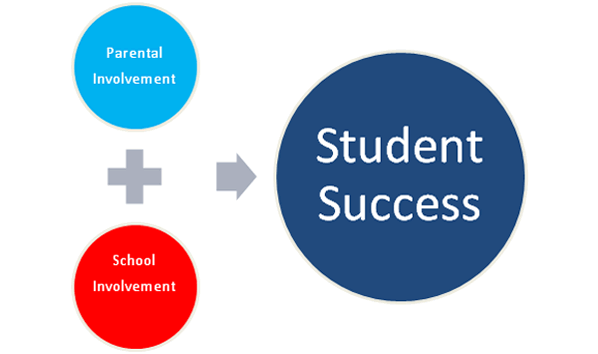Importance of Parental involvement in School

Progressing research shows that family commitment in schools improves student accomplishment, decreases truancy, and reestablishes parents' trust in their children's education. Students with included parents or different guardians procure higher evaluations and test scores, have better social abilities and show improved behavior. Parents are their children's first instructors. Children find out about existence from the models and desires set by their parents or gatekeeper. When children begin going to school, their social and educational world grows significantly. Be that as it may, it is fundamental for parents, those first significant educators, to remain engaged with their child's education and support learning.
Getting dynamic in a school's parent bunch is a significant method to expand involvement. Involvement likewise incorporates:
Defining objectives with children and cultivating accomplishment of those objectives;
Getting to and utilizing children's scholarly scores to guarantee they're on track;
As often as possible review the parent entryway (or whichever instrument their school employments);
Building up an association with children's instructors and staying in contact with them frequently; and
Pushing for upgrades in the school building and with nearby school sheets and state and national government to guarantee schools have the assets they have to give a world-class education to each student.
The most critical kind of involvement is the parent's main thing at home. By observing, supporting and upholding, parents can be occupied with ways that guarantee that their children have each open door for progress.
As the pioneers of the country's biggest education and child promotion affiliations, we have seen firsthand the positive effect of family commitment on student achievement and school improvement. We urge all parents to play a functioning job in their children's education on "Parents Day" and throughout the entire year.
Imparting – Families and schools speak with one another
in numerous manners. Schools send home notes and flyers about significant occasions
what're more, exercises. Parents give instructors data about their child's wellbeing and
educational history. A school site is an extra method of correspondence
with parents and families. Incorporates: meetings with each parent in any event once
a year, language interpreters to help families varying, normal calendar of valuable notification, updates, calls, pamphlets, and different correspondences.
Volunteering – applies to enlist and sorting out assistance and backing
from parents for school projects and students' exercises. There are three
essential ways that people volunteer in education. To start with, they may volunteer in
the school or study hall by helping instructors and administrators as mentors or aides. Second, they may volunteer for the school; for example, raising money for
an occasion or advancing a school in the network. At last, they may volunteer
as an individual from a group of people, going to school projects or exhibitions.
Incorporates: school/homeroom volunteer program to support instructors, managers, students, and different parents, parent room or family community for volunteer
work, gatherings, and assets for families, yearly postcard overview to distinguish
every accessible ability, times, and areas of volunteers.
Learning at home –
relates to giving thoughts and data to parents about how they can best help their children with schoolwork and curricular-related choices and exercises. Parents helping their children with schoolwork or taking them to a historical center are instances of this sort of involvement.
These exercises produce a school-situated family and urge parents to
associate with the school educational plan. Exercises to empower learning at home
give parents data on what children are doing in the study hall
furthermore, how to assist them with schoolwork. Incorporates: data for families on
abilities required for students in all subjects at each evaluation, data on schoolwork arrangements and how to screen and talk about schoolwork at home, just as
family cooperation in defining student objectives every year and in making arrangements for school or work.
Basic leadership – alludes to remembering parents for school choices and
to creating parent pioneers and agents. Parents partake in school
basic leadership when they become some portion of school administration boards or
join associations, for example, the parent/educators affiliation. Other decisionmaking exercises remember taking for positions of authority that include spreading data to different parents.
Students Will Perform Better in School
In the event that parents are demonstrating enthusiasm for their children's education, children will, thus, be bound to perceive that their education is significant.
"Research proposed Parent as Partner helps children consideration and recognition which, thusly, causes them to perceive their education is deserving of grown-up intrigue. As children will in general model grown-up practices, when parents are effectively associated with their schooling, children will become familiar with the significance of education and attempt to imitate those practices from their parents.
As per the National Education Association, "Progressing research shows that family commitment in school improves student accomplishment, decreases truancy, and reestablishes parents' trust in their children's education. Students with included parents or different guardians acquire higher evaluations and test scores, have better social abilities, and show improved conduct."
And keeping in mind that it's smarter to have one parent show enthusiasm for a child's education, investigate shows that getting the two parents on board can have a significant effect.
"Students with two parents working in steady jobs are 52% bound to appreciate school and get straight A's than students whose parents are separated from what's happening at school."
The advantages of parental involvement for children:
There will be an intense improvement in all the fields of the child's life independent of the racial or ethnic foundation, financial status, or parents' education level and occupation
Their scholastic status will improve; they accomplish better evaluation, test scores, and participation.
They will constantly finish their schoolwork
It will expand their confidence and they become progressively self-trained
At the point when parents and educators cooperate, it will overcome any issues between the two societies – societies at home and at school
They will in general show more enthusiasm towards school
Comments
Post a Comment